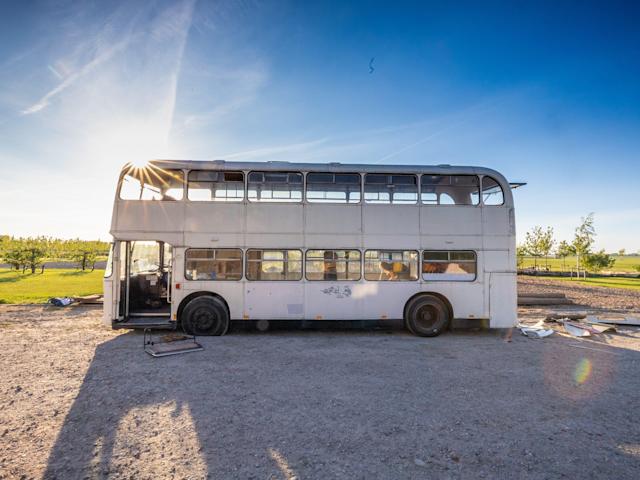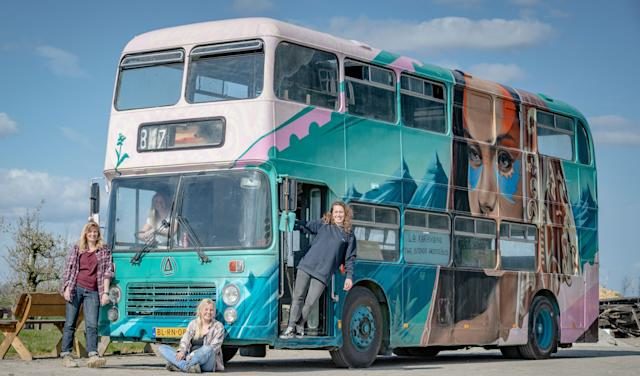4 women transformed a double-decker bus into a mobile hostel where beds cost $400 per weekend – take a look inside
Written content from Frank Olito

“I’m proud of the four of us that we created this bus,” van Leeuwen said. “Even though we didn’t have any experience building a bus or owning a bus, [it shows] nothing is impossible.“
Saskia van Leeuwen bought a double-decker bus with her three friends and renovated it. Now, it’s a hostel with a living room, nine bunk beds, and a unique kitchen. For $464 to $990, you can rent a bed on the hostel bus for a weekend or a week.
When van Leeuwen was working in events management in the Netherlands, she was dreaming of working in the travel industry. After years of traveling, she had fallen in love with hostels and wanted to open one herself, but she said that felt too limited.
“I didn’t really like the idea of being stuck in one place,” van Leeuwen said. “The perfect solution for that is to have a hostel that can actually move.”
She enlisted the help of her twin sister, Jolisa van Leeuwen, and two friends, Eileen Helfferich and Lisa de Bree. Together, they decided to open a hostel aboard a bus that they could drive around and take to different locations.
First, they found a double-decker bus for sale on a Dutch online marketplace and bought it for just over $8,000.
When they toured the 430-square-foot bus, they knew it was perfect.
“Immediately, we were like, ‘Oh my God, this is amazing,'” van Leeuwen said. “We could visualize the beds, the kitchen, and everything.”

They pooled their money and bought the bus for 7,000 euros or $8,136.
Then they took the bus to a street-art festival and enlisted the help of artist Tymon de Laat.
He surprised the women with a unique design on the exterior of the bus.
“After Tymon painted the bus, everyone [was] like, OK maybe, maybe this is gonna work,” van Leuween said.
With no renovation background, the four friends had to learn as they went.

During the renovation, they relied on their event-management backgrounds and treated the process like one giant event. They organized everything and treated it “quite professionally,” van Leuween said.
The first step was changing out the rubber insulation around the windows because it kept causing leaks. The seemingly simple task actually took them a couple of months to fix. Once that was complete, the women insulated the bus and worked on building out the interior with help from YouTube videos and local builders.
During the renovation process, they focused on building out the bus full-time.
Since most of them worked in events management, they didn’t have jobs during the COVID-19 pandemic in 2020. That gave them free time to focus on renovations, which usually amounted to 30 to 40 hours per week.

“For us, the timing couldn’t be better,” van Leeuwen said. “It would’ve been more of a challenge because we wouldn’t have had so much time [to work on the bus].”
While renovating, they also had to get a special license to drive the bus.
n the Netherlands, they needed a license to drive a truck that size, so they all had to take lessons. Unfortunately, it took them several months to practice and to take the test because COVID shut down everything in the Netherlands.
Luckily, van Leeuwen said she passed the test the first time.
“It’s fun because if I drive the bus, you see people look and then look again, and say, ‘Is that a chick?'” she added.

In the back of the bus, there is a large seating area.
After a year and a half of working on the bus, they finally had a livable tiny house.
In the end, they spent around $40,000 on renovating the bus. They did, however, get $17,000 from a crowdfunding campaign to help offset the costs.
Now that the bus is complete, the downstairs has a unique kitchen.
The sink is actually a tin bucket, while the cabinet handles are belt straps they found at thrift stores. There are two refrigerators in the kitchen as well.
In the back of the bus, there is a large seating area.
Van Leeuwen said they like to play board games and eat dinner back here.

You get to the bathroom from the outside of the bus.
A wall separates the living room from the bathroom, but since you have to enter the bathroom from the outside, van Leeuwen said it makes it feel more private.

There are also nine bunk beds on the second floor.
The four women don’t live on the bus full-time. Instead, they take turns hosting trips and driving the bus for guests, switching out two at a time. Therefore, two beds on the second floor are for the women and the seven other beds are for guests.
Each bed has a privacy curtain and a reading light.
At the end of 2021, their hostel, La Karavana, finally hit the road.

So far, La Karavana has traveled to a couple of regions in the Netherlands, including Overijssel and Groningen. Read more from Business Insider
Subscribe Here





